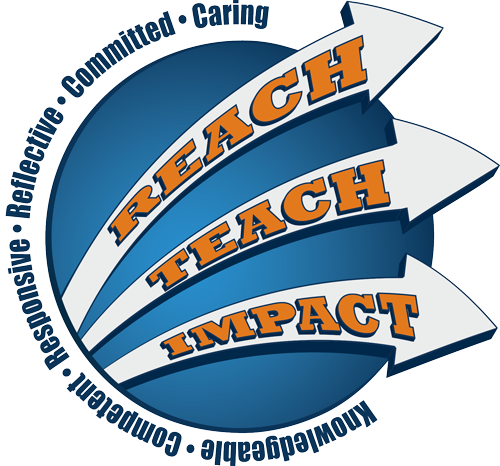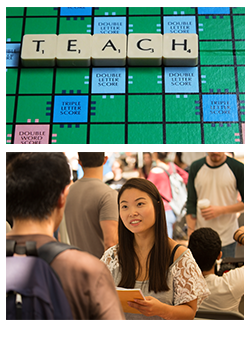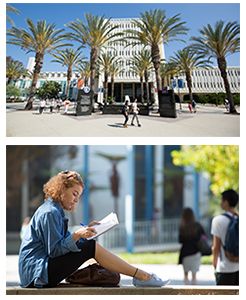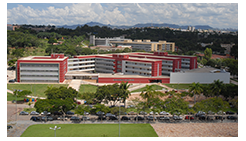CSUF Graduate Programs in TESOL
-
MS in TESOL
-
Graduate TESOL Certificate

 The TESOL Program is nationally accredited by the National Council for Accreditation of Teacher Education (NCATE), the premier accrediting agency for education professionals. California State University, Fullerton has the only professional education programs in Orange County accredited by NCATE.
The TESOL Program is nationally accredited by the National Council for Accreditation of Teacher Education (NCATE), the premier accrediting agency for education professionals. California State University, Fullerton has the only professional education programs in Orange County accredited by NCATE.
Introduction
Enthusiasm for language, desire to meet people from all over the globe, and love of teaching are a few of the many reasons to select the Master of Science in Education with a concentration in Teaching English to Speakers of Other Languages (TESOL), or the Graduate TESOL Certificate![]() , which are offered by the Department of Modern Languages and Literatures. The
, which are offered by the Department of Modern Languages and Literatures. The master's degree program is the largest public university master's program in TESOL in Orange County.
master's degree program is the largest public university master's program in TESOL in Orange County.
Our graduate programs focuses mostly on the training of ESL/EFL teachers for adult second-language learners of English who are at adult schools, private and public colleges and universities, and intensive English programs. The Graduate TESOL Certificate is primarily intended for students who already have or are in the process of earning a master's degree in a related field such as linguistics, English, foreign languages, composition and rhetoric, or some other area of education. Students completing the MS in TESOL automatically receive the Graduate TESOL Certificate as well.
Both are exciting, multi-disciplinary programs involving study in the fields of English, linguistics, education, anthropology, American studies, human communication studies, and psychology. Courses are conveniently offered after 4 p.m. on weekdays. Our faculty members have expertise in teaching English in the U.S. and abroad in public school, adult education, intensive English program, community college, and university settings.
For information on undergraduate TESOL programs at CSUF, please click here.
Goals
- Students enter with a continuum of educational needs but graduate prepared
to achieve their personal, civic, educational and career goals. - Students develop the habit of intellectual inquiry and are able to communicate effectively.
- Students use state-of-the-art technology.
- Students work effectively in multicultural environments.
- Students work effectively in collaborative settings.
Please read the College of Education and TESOL Program conceptual framework, mission statement, program outcomes and indicators, and professional disposition statements, as well as an expanded version of the program goals for the M.S. in TESOL.
Career Opportunities
Graduates may go on for doctoral work; however, the majority of graduates work as instructors in adult and community college English as a Second Language (ESL) programs in Orange, Los Angeles, Riverside, and San Bernardino counties. Some have been hired as resource specialists and program coordinators, while others have taught or done teacher training abroad.
Students interested in earning the new World Language: English Language Development (ELD) Secondary Credential, which provides for single subject licensing as a public school teacher of ESL, should consult the TESOL Program's page on the ELD Single Subject Matter Preparation Program. That program is slated to begin in Fall 2015.
The course work for the master's and graduate certificate programs in TESOL provide background information that will facilitate passing the State of California Cross-cultural Language and Academic Development (CLAD) Examination, the World Language: ELD CSET Examination![]() , and obtaining the Adult Education Teaching Credential.
, and obtaining the Adult Education Teaching Credential.![]()
Advisement
An assigned TESOL advisor provides academic and career advisement. Advisement takes place during the instructor's office hours. All students must meet with an advisor within the first semester of graduate course work to develop a study plan. You will be assigned an advisor in your admission letter from the TESOL Coordintor. Call the department office to obtain an advisor's name, phone number, and email address.
Advisers
Please check with MLL Department. Your adviser will be one of the faculty listed on the department webpage.
Admission Requirements
Students who wish to begin work in the department's graduate programs must first apply for admission within the appropriate filing period to Cal State Fullerton and declare their objective as Master of Science in Education with a  concentration in Teaching English to Speakers of Other Languages (TESOL) or the Graduate TESOL Certificate. Applications must be filled out online at Cal State Apply.
concentration in Teaching English to Speakers of Other Languages (TESOL) or the Graduate TESOL Certificate. Applications must be filled out online at Cal State Apply.
The application deadline for fall admission is usually July 1 of that year. The application deadline for spring admission is usually November 1 of the preceding year. Exceptions to the deadline can be requested in some cases; contact the TESOL Coordinator for additional information. Please note that these are the deadlines for applications to be submitted online, not the deadlines for all required materials to be submitted.
International applicants are advised to apply well in advance of the deadlines, in order to allow time for issuing an I-20 and obtaining an F-1 student visa.
Please see the TESOL Program's Admissions FAQ (Frequently Asked Questions) page for additional information.
The minimum university and departmental requirements for both programs include:
- A baccalaureate degree from an accredited institution (Note: Seniors at CSU Fullerton may take up to 9 elective or core units in the graduate program during their senior year, prior to graduating. These can be transferrable to the graduate program once students have been officially accepted into the program.)
- A GPA of at least 2.7 in the last 60 semester units attempted
- A 3.0 GPA in the major
- Good standing at the last college attended
M.S. in Education (TESOL) and Graduate TESOL Certificate prerequisites include the following:
Prerequisites Applicable to Both Programs
- Two years of one foreign language, or one year each of two different foreign languages or the equivalent with an average 3.0 grade point average. The requirement will normally be waived for students from foreign countries who have studied English as a foreign language.
- Modern Language (MLNG) 301—Writing in an Intercultural Context--with a grade of "B-" or better, or with program approval, the EWP with a score of 6 or better.
- TESL 315 or ENGL 303 with a grade of "B-" or better.
- Oral and written proficiency in English to be determined during student's first semester in the program
- A minimum TOEFL score of 573 for paper-based or 89 for the iBT, OR a minimum IELTS score of 7.0 overall OR a minimum Pearson Test of English (PTE) Academic score of 65 is required, AND
-
A minimum score of 26 on the speaking section of the iBT OR 7.0 on the IELTS speaking section, OR a passing score on the TESOL Program's in-house interview test (to be verified no later than at the end of the student's first semester in the program) are required for non-native English speaking applicants who completed their bachelor's degrees outside of the U.S. in a language other than English. (For conditional admission, students may obtain a 23 on the iBT speaking section or a 6.5 on the IELTS speaking section.)
MS TESOL-Specific Prerequisites
- One of the following: TESL 445 OR American Studies 301, 345, Anthropology 300, 360, Human Communication 320 or an equivalent culture course OR English 300, or an equivalent survey of English or American literature course with a grade of "B-" or better.
- Linguistics 106, or 206, or 406 with a grade of "B-" or better
Graduate Certificate-Specific Prerequisites
- N/A. See prerequisites listed above.
In addition, admission to either program requires completion of all course prerequisites and the development of an approved study plan, in consultation with an advisor, prior to the completion of nine units applicable to the study plan.
Please consult the University catalog for more details
![]() .
.
Study Plan (Coursework)
The master's degree study plan includes 33 units of committee-approved course work: 18 units of core courses, three units of language pedagogy, nine units of electives, and three units for the practicum, which includes a comprehensive examination.
The graduate certificate study plan includes 24 units of committee-approved course work: 12 units of core courses, three units of language pedagogy, six units of electives, and three units for the practicum, which does not include a comprehensive examination.
All TESOL students must obtain a minimum of a "B-" grade in each core course and a "B-" (2.7) average in all language pedagogy and elective courses combined. Per University policy, a student may not take a given graduate course more than twice.
Master's Degree Core Courses (18 units required)
- TESL 500 – Fundamentals in TESOL (3 units)
- TESL 509* – Advanced Principles of TESOL – Listening/Speaking Focus (3 units)
- TESL 510* – Advanced Principles of TESOL – Reading/Writing Focus (3 units)
- TESL 527 – Second Language Acquisition (3 units)
- TESL 560 – Second Language Assessment (3 units)
- TESL 595 – Curriculum and Program Design for TESOL (3 units)
Graduate Certificate Core Courses (12 units required)
- TESL 500 – Fundamentals in TESOL (3 units)
- TESL 509* – Advanced Principles of TESOL — Listening/Speaking Focus (3 units)
- TESL 510* – Advanced Principles of TESOL — Reading/Writing Focus (3 units)
- TESL 527 – Second Language Acquisition (3 units)
Language Pedagogy (3 units required for both)
- TESL 515* – Pedagogical Grammar and TESOL (3 units)
- TESL 520* – Teaching Pronunciation and Oral Discourse in TESOL (3 units)
- TESL 525 – Teaching Vocabulary in ESL/EFL (3 units)
Culminating Experience (3 units required for both)
- TESL 596 – TESOL Practicum (3 units)
- The practicum is to be taken at the end of the program. Prerequisites are TESL 500, 509, 510 and 527.
- The core and language pedagogy courses must be completed with an average of "B-" or better in order for students to enroll in the practicum
*SERVICE LEARNING REQUIREMENT: In at least one of these courses, each student must complete 16 hours of service-learning at one of the sites approved by the TESOL program.
Electives (9 units / 6 units)
Students choose nine units for MS TESOL program and six for the Graduate Certificate program from the list of courses provided below. Other 400- and 500-level courses may also be selected with advisor's approval. Complete descriptions of courses can be found in the departmental course listings in the catalog. Prerequisites will be enforced.
Culture and Literature
- TESL 511 – Teaching English Abroad (3 units)
- TESL 545 – Teaching Culture in the Language Classroom (3 units)
- ANTH 412 – Culture Change (3 units)
- ANTH 470 – Survey of Anthropological Films (3 units)
- CHIC 450 – The Chicano and Contemporary Issues (3 units)
- CHIC 480 – The Immigrant and the Chicano (3 units)
- HCOM 420 – Communication Theory (3 units)
- HCOM 422 – Applications of Intercultural Communication (3 units)
- HCOM 522 – Seminar in Intercultural Communication (3 units)
- READ 560 – Cross-Cultural Approaches to Teaching Reading/Language Arts (3 units)
Examples of 400- and 500-level American Studies courses (need advisor 's approval): American Humor, The White Ethnic in America, Religion and American Culture, The Shifting Role and Image of the American Male, Southern California Culture, Love in America, Childhood and Family in American Culture, The Search for Community, Visual Arts in Contemporary America, American Minds: Images of Sickness and Health, American Folk Culture, Television and American Culture, the Built Environment, the American West in Symbol and Myth, Women in American Society, Bohemians and Beats: Cultural Radicalism in America, The Culture of the American South, Culture in Turmoil: 1960s America.
Examples of 400- and 500-level English or American Literature courses (need advisor's approval): Introduction to Afro-American Literature, Children's Literature, Literature for Junior or Senior High School. The Development of the English Novel through Jane Austen, The Romantic Movement in English Literature, Victorian Literature, The Development of the 19th C. English Novel, Modern British and American Novels, Modern British and American Drama, Contemporary Drama in English, Traditions of English Literary Criticism, Modern Critical Theory.
Language and Linguistics
- TESL 515 – Pedagogical Grammar in TESOL (if not taken as language pedagogy course) (3 units)
- TESL 520 – Teaching ESL/EFL Pronunciation and Oral Skills (if not taken as language pedagogy course) (3 units)
- TESL 525 – Teaching Vocabulary in ESL/EFL (if not taken as language pedagogy course) (3 units)
- ANTH 416 – Anthropological Linguistics (3 units)
- FREN, GRMN, JAPN or SPAN 466 – Introduction to French, German, Japanese, or Spanish Linguistics (3 units)
- JAPN or SPAN 468 – Japanese or Spanish-English Contrastive Analysis (3 units)
- LING 412 – Sociolinguistics (3 units)
- LING 417 – Psycholinguistics (3 units)
- LING 442 – Changing Words (3 units)
- LING 505 – Phonological Analysis (3 units)
- LING 507 – Grammatical Analysis (3 units)
- LING 508 – Theories of Syntax (3 units)
- READ 514 – Linguistics and Reading (3 units)
- SPAN 467 – Spanish-English Bilingualism and Language Contact (3 units)
Testing, Technology and Research
- TESL 530 – TESOL Research Methods (3 units)
- TESL 532 – Technology in Second Language Learning (3 units)
- TESL 560 – Second Language Acquisition (3 units) (Elective for Graduate Certificate only; required for the MS)
- ANTH 401 – Ethnographic Field Methods (3 units)
- EDEL 511 – Survey of Educational Research (3 units)
- EDEL 515 – Problem Solving Strategies Including Logo (3 units)
- EDEL 518A – Issues in Instructional Design of School Software (3 units)
- EDEL 518B – Multimedia Instruction and Development in the Classroom (3 units)
- EDEL 519 – Advanced Technology in Education (3 units)
- EDEL 522 – Web Design and Instruction (3 units)
- EDEL 551 – Assessment Across the Curriculum (3 units)
- EDEL 590 – Practicum: Elementary School Teachers ad Computers (3 units)
- EDSC 504 – Advanced Instruction Proficiency in Secondary Educational Technologies (3 units)
- EDSC 524 – Assessing Student Learning (3 units)
- EDSC 535 – Survey of Educational Research (3 units)
- LING 501 – Research Methods and Bibliography (3 units)
- PSYC 461 – Psychological Testing (3 units)
- PSYC 465 – Advanced Psychological Statistics (3 units)
- READ 516 – Diagnostic-Perspective Teaching of Reading (3 units)
- READ 520 – Technology in Reading (3 units)
Professional Education
General
- TESL 595 – Curriculum and Program Design for TESOL (3 units) (Counts as an elective for the Graduate Certificate only; required for the MS)
Elementary Education
- EDEL 434 – Methods and Inquiry for Teaching English Learners (3 units)
- EDEL 500 – Bilingual Multicultural Curriculum (3 units)
- EDEL 521 – The Study of Teaching (3 units)
- EDEL 528 – Reading/Language Arts in Early Childhood Curriculum (3units)
- EDEL 529 – Graduate Studies: Learning Theory for Classroom Use (3 units)
- EDEL 530 – Graduate Studies in Elementary Education: Second Languages (3 units)
- EDEL 531 – Graduate Studies in Elementary Education: Integrated Language Arts (3 units)
- EDEL 536 – Curriculum, Theory and Development (3 units)
- EDEL 541 – Psychological and Sociological Foundation of Bilingual Education (3 units)
- EDEL 542 – Current Issues and Problems in Bilingual-Bicultural Education (3 units)
- EDEL 552 – Family, Community and Professional Partnership (3 units)
- EDEL 553 – Models of Teaching (3 units)
- READ 508 – Teaching Reading/Language Arts in Today's Elementary Schools (3 units)
Secondary Education
- EDSC 410 – Teaching English Learners in Secondary Schools (3 units)
- EDSC 522 – Family, Community and Professional Partnership (3 units)
- EDSC 536 – Curriculum, Theory and Development (3 units)
- EDSC 540 – Graduate Studies in Teaching English Learners (3 units)
- EDSC 550 – Instructional Strategies (3 units)
- FLED 442 – Teaching Foreign Languages in the Secondary School (3 units)
Adult/College Education
- ENGL 402/402S – Theories, Response to Written Composition (2 units)/Tutor Supervision (1unit)
- ENGL 590 – Writing Theory and Practice for Teaching Associates (3 units)
- READ 507 – Reading and Thinking in the Content Areas (3 units)
- READ 581 – Remediation of Reading Difficulties (4 units)
Comprehensive Examination
After completing all coursework, master's degree students must take a written examination of all the courses taken in the program. An oral examination may also be required. This course includes a written examination and may include an oral comprehensive examination. The candidate may, with the approval of the graduate committee, repeat the examination once, but only once, within two years of having taken it for the first time. For more information, contact the TESOL graduate program adviser in the Department of Modern Languages & Literatures.
Changes in Study Plan
If a classified graduate student wishes to make a change in the approved M.S. study plan, a request should be made to the appropriate graduate program advisor. Requests must be made prior to registration in any course work to be substituted or added. No course may be removed from the study plan after a student has taken it. Forms which may be used to file a request for change in study plan are available from graduate program advisers.
Special Features and Programs
The program has a collaborative exchange program with the Federal University of Minas Gerais (UFMG) in Belo Horizonte, Brazil. Students may complete coursework towards their major, including the teaching practicum, while studying abroad in Brazil. Depending upon experience, some students may also be able to work while they are there. The application deadline is about five months prior to the semester abroad: October 1 for Semester I at UFMG (spring at CSUF), and March 1 for Semester II at UFMG (fall at CSUF).
Brazil. Depending upon experience, some students may also be able to work while they are there. The application deadline is about five months prior to the semester abroad: October 1 for Semester I at UFMG (spring at CSUF), and March 1 for Semester II at UFMG (fall at CSUF).
Students may also apply to the English Writing Center, and the Office of Graduate Studies for part-time work on campus.
The use of technologies is an integral part of our program.
Scholarships and Awards
The Department of Modern Languages & Literatures and College of Humanities and Social Sciences honor outstanding TESOL candidates each year at graduation.
A small number of non-resident tuition waivers are available for students with superior academic records or exceptional professional promise who live out of state or outside the U.S. Applicants must submit letters of request with transcripts, 3 letters of recommendation, and TOEFL scores (if appropriate) to the TESOL Coordinator no later than April 15 preceding each fall semester. Tuition waivers are mostly granted to fall semester applicants.
For information on merit-based scholarships and grants available to continuing TESOL students, please go to the Modern Languages & Literatures Scholarships section.
Student Activities or Professional Development
The TESOL Club invites all M.S. in TESOL and Graduate TESOL Certificate majors to participate in regular club activities, which may include speakers, conferences, eating out, and holiday celebrations. Students have also participated with faculty on classroom and school-based research projects, poster and paper presentations at professional conferences, and conference planning.
